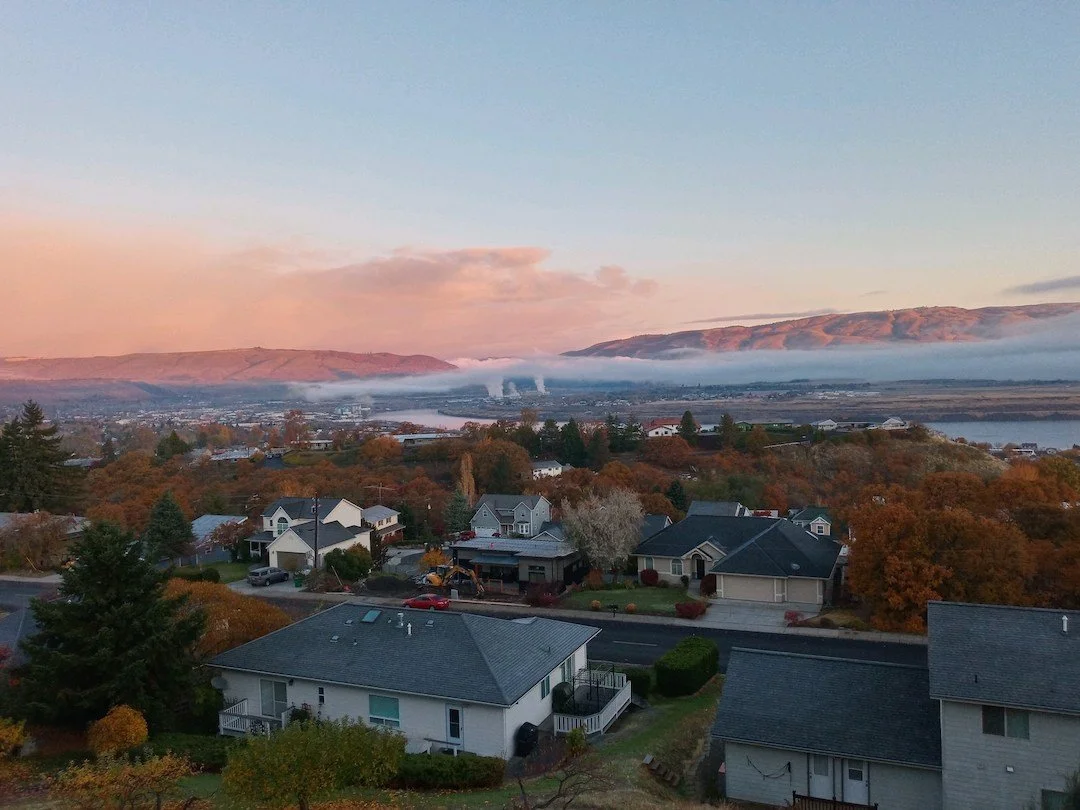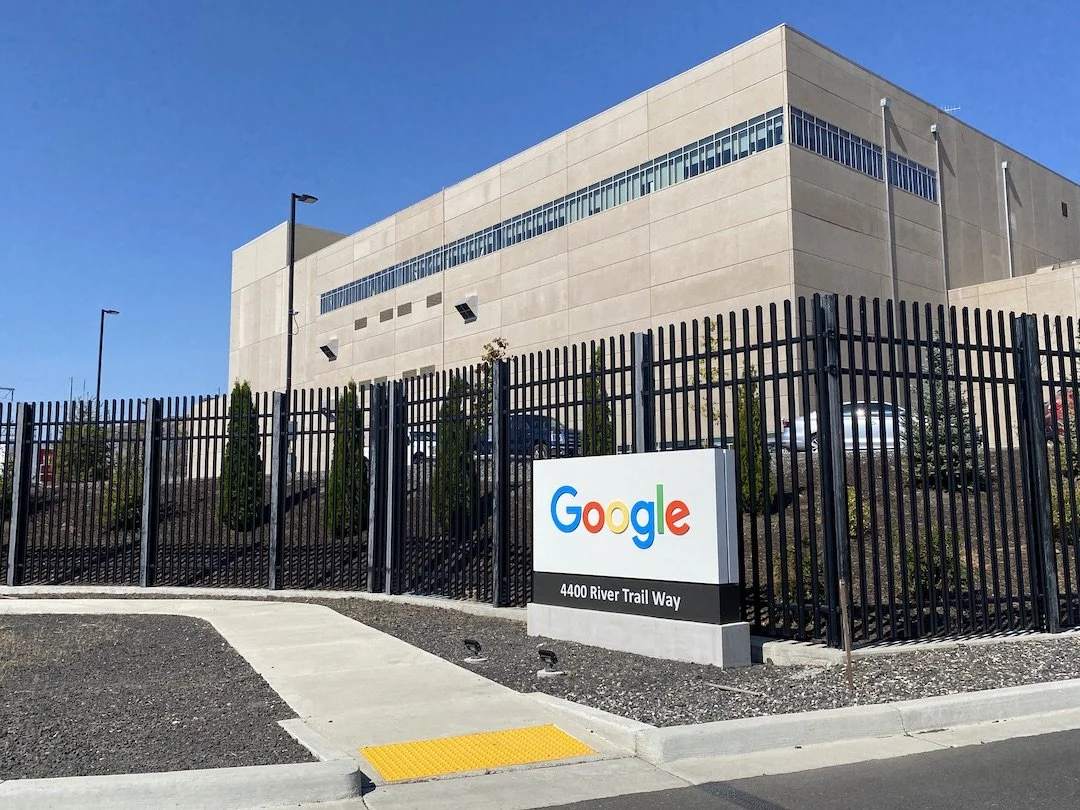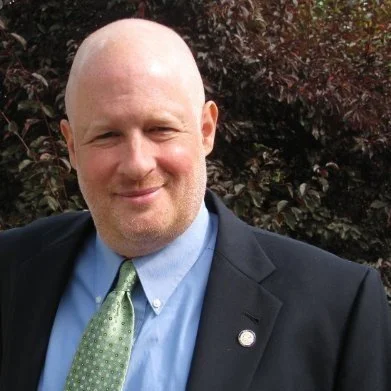Hecklers and hard question doesn't stop Google water deal
Google from a distance supplies a steady supply of steam along the Columbia Hills in a recent photo by Allan Peterson
By Tom Peterson
Amidst interruptions and some nasty images, The Dalles City Council held its public hearing on Monday, Nov. 8, on tripling the size of the City’s potable water system to in part accommodate two new data centers for Google in the Port of The Dalles.
Google has agreed to foot the estimated $28.5 million bill for the improvements.
How much water Google uses was not disclosed as Google claims it is a trade secret and City leadership has agreed not to reveal the information.
While it is being kept a ‘trade secret’ Google has tipped its hand a bit. Google operators have told the city two new data centers would use less than Google’s water rights of 3.88 million gallons per day. At full use of those rights, it comes to 1.4 billion gallons, annually.
On Monday, Councilors voted unanimously to take the deal after negotiating a ZOOM meeting that started with hecklers using some profane language and one even signing in under the name of City Councilor Rod Runyon.
City Clerk Izetta Grossman spent a good deal of time at the outset eliminating unruly participants from the ZOOM meeting.
Councilor Tim McGlothlin
Before the vote, Councilors talked about their longevity in the community, the fact they had children here and they were making the best decision for current and future generations. They noted they had poured over the facts of the deal numerous times and were content with the agreement that they were about to strike with Google.
“I am committed to and love this city,” said Councilor Tim McGlothlin, noting he has lived here 48 years. “I would not do anything to harm it. We get emails that call us names and use profanity, and it’s not appreciated. I am doing my best to represent you. I hear you… I also have a fiduciary obligation to do what is in the best interest of the city. That is what I will do.”
Councilor Scott Randall moved to approve the deal, McGlothlin seconded the motion and a unanimous vote in favor followed.
Here is the list of water projects that Google has agreed to pay for under this agreement.
“To control our water is to control our destiny,” said Councilor Dan Richardson of accepting water rights of 3.88 million gallons per day from Google in the deal. “I feel it is a great deal for us… It increases resilience and capacity… I think it is a win.”
Wells and Residents Vs. Google Water supply
Dawn Rasmussen
County resident Dawn Rasmussen told Council she was concerned about climate change and the possible impacts on groundwater as a recent report from Oregon Public Broadcasting projected that the snowpack could be eliminated by 2070. She said she and her neighbors had already been seeing declines in their well levels during recent years.
She said the city had a lack of information in the event that rainfall continues to decline, resulting in a deficit situation.
“What happens where the overall pattern of rainfall is decreasing? We may have new pipelines but if there is no water coming down the pipelines what does that do to our community and who is going to win the water war,” she asked.
Anderson agreed, stating they did not have a projection of water deficits because the plan calls for charging The Dalles Groundwater Reservoir by pumping treated surface water into it via a new well on Google property.
In the event that water did become scarce, he said public health and safety are the first priority. Meaning, human consumption trumps cooling data plants.
Effect on Water Temperatures and Fish
Public Works Director David Anderson
Dr. Bruce Schwartz, asked for a second time in as many meetings, what effect Google is having on effluent going into the Columbia River.
“In view of the Columbia River reaching lethal temperatures for migratory and anadromous fish this summer, I am curious about the temperature that we discharge in The Dalles currently and what temperatures would be discharged when Google takes on a greater volume of water. What are the parameters in terms of temperature, and what do they reach in terms of maximum in the summertime. I presume it is all public information.”
Schwartz did not get a definitive answer.
“I don’t have the information on specific temperatures and what our outfall temperatures are right now,” Anderson said. “...I can tell you we are within our permit parameters with DEQ, and one of the elements of an industry discharging to city sanitary system if they are going to trigger I think more than 2 percent of flow… we undertake a temperature analysis and limit them on a case-by-case basis so the city stays within its temperature discharge parameters.”
Mayor Mays asked if the information could be provided.
Anderson said yes, stating Schwartz could file a public information request.
“Industrial discharge permits issued are already public record. It would take a little bit more work, but we could get discharge data from the wastewater system plant.”
Groundwater Reassurances?
Josh Ellyson, a resident on 7-Mile Hill road, said he was not reassured when Anderson said he “believed” the buildout of the system would have no effect on local wells.
“I would like to hear something more reassuring,” Ellyson said.
Anderson said utilizing groundwater would have no effect on Ellyson’s well because it was drawing from a different aquifer.
He also said that the amount to be taken from The Dalles Groundwater Reservoir was far below its capacity of 5500-acre feet annually or 1.8 billion gallons.
Later in the meeting, Anderson said those numbers came from a 2018 study.
Three studies paid for by Google were done in preparation for building out the water system. Read them here and here and here.
A Little History
Having enough water has been an issue in The Dalles since the 1950s.
Reports of declining well water were met with a state investigation, and The Dalles Groundwater Reservoir was identified as a critical groundwater area in 1959.
The pool of water lies in a column of fractured basalt 300 feet below ground.
Water rights in The Dalles were capped at 25,251 gallons per minute through 34 assignments of ownership in 1959.
All of those water rights still exist today, but many of them are not utilized to their full potential or are dormant and the water conserved.
That happened because The Dalles Irrigation District received a permit to pull water from the Columbia River in the late 1960s. And in the 1980s’ Northwest Aluminum, which held 5,000 gallons per minute of water rights slowed water usage as the plant was mothballed.
Ever since, The Dalles Groundwater Reservoir has steadily increased in volume, according to reports by the Oregon Department of Geology.
In the ‘50s and ‘60s, the groundwater reservoir was being tapped for 15,000 acre-feet or 4.89 billion gallons of water per year, Anderson said. And the reservoir was only capable of delivering 5,500 acre-feet of water or 1.8 billion gallons annually without dropping the level of the aquifer.
Currently, Anderson said only 1,800 acre-feet - 587 million gallons are being taken from the groundwater reservoir annually.
According to the staff report, the city would also utilize its water rights for 1.3 million gallons per day to meet the demand.
And Google will give its water rights of 3.88 million gallons per day to the city to utilize.
Anderson said the system has the capacity to deliver the water for both Google, residents and other industry.
“I feel confident that we can implement these concepts without adverse effect on other users,” he said.
Breaking News
One minute after the meeting ended Monday, Nov. 8, CCCNews received a press release from Google’s Chris Wilson lauding the benefits Google had brought to The Dalles since its arrival.
Google is receiving $240 million in property tax abatements thus far with their three data centers in The Dalles and by one estimate will save another $147 million in years to come if they build out $1.2 billion in two new data plants.
At the same time, the latest agreement captures 50 percent and 60 percent of total property taxes - which is much more than past Google deals for data centers in The Port of The Dalles. Mays has stated the deal represents up to $125 million in revenues for the community over the life of the two 15-year agreements.
The money will come in the form of reduced property tax payments and two different fees that will provide money for community investments that are yet to be determined. The first of Google’s data plants will come off of tax abatements after 2022, and it will receive its first full property tax bill in the fall of the same year.
Alphabet, the parent company to Google, places in the top 10 of the world’s largest corporations and was valued at about $2 trillion on Monday, Nov. 8 - up $1 trillion since January 2020, according to a story by Emma Roth on the verge.com
A trillion is a million million.
“Google’s commitment to The Dalles goes far beyond the data centers and the jobs they’ve created here,” Mays was quoted in the Google press release. “The company’s donations to our school districts and community college have been critical, as has their support for expanding internet access to our community’s most vulnerable, such as agricultural workers and others.”
Google’s press release also points out that they have contributed more than $16 million in grants to nonprofits over the past 15 plus years in Oregon.
To read the entire press release, click here.
Here is a map of where two new data plants would be developed within the blue lines. Google owns some 195 acres in the Port of The Dalles under the name Design LLC.
Google paying for City Suit Against Oregonian
During the meeting, City Attorney Jonathan Kara told Council that Google is paying for any costs associated with its suit against Oregonian Reporter Michael Rogoway who requested Google water usage data.
Rogoway submitted a public records request to the City for Google’s current water usage for 2020 and the preceding five years.
Kara denied the request, stating the information in his opinion is a ‘trade secret’ under Oregon law and therefore exempt. City leadership also signed a non-disclosure agreement in regard to the information.
The Oregonian appealed the decision to Wasco County District Attorney Matthew Ellis whole determined the information was public record.
To avoid releasing the information, Kara with City Council approval is currently suing Rogoway in Wasco County Circuit Court, which is essentially an appeal for another judgment. A Wasco County Circuit Judge will rule on the case in weeks to come. The Oregonian has yet to respond to the complaint and no court date was set as of this morning, Nov. 9.
Kara explained on Monday night that Google agreed to pay for the suit back in 2015 when the last data plant deal was completed. In the non-disclosure agreements, Google agreed to hold the city harmless, thus making Google responsible for attorney fees in the ‘trade secret’ suit.
Tax Abatement Deal Approved Locally - On to State
The City and Wasco County have both approved the strategic investment plan that abates taxes for Google’s two new proposed data centers. Google’s Company Design LLC and the City and County must now receive approval from the Oregon Business Development Department in Salem.
State Business Incentives Coordinator Arthur Fish
State Business Incentives Coordinator Arthur Fish said he was unaware of applications being received on Tuesday, Nov. 9. CCCNews has a call into Department spokesperson Nathan Buehler for additional information.
Last month, City Council stated that the application must be filled out and either approved or denied within 20 days of receipt.
The State of Oregon allows tax abatements through the strategic investment plan through two Oregon Revised Statutes - ORS 285C.600–285C.635 & 307.123 - according to the application.
To read more about the tax abatements and Google’s payments, read CCCNew’s original story here.







